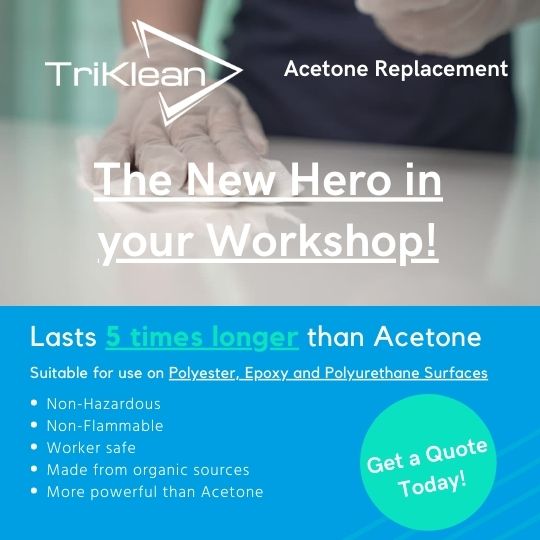ACETONE REPLACEMENT
Acetone Replacement

acetone vs acetone replacement
To begin with, acetone ranks as the most common solvent cleaner in workshops today. In fact, manufacturers have developed and refined it over time to effectively clean and degrease composite tools. Moreover, it efficiently removes uncured resin and gel materials from tools.
Besides serving as a solvent, people also use acetone as:
- An additive in cosmetics
- A nail polish remover
- A fuel additive
Nevertheless, considering all the benefits acetone brings to various industries, you might ask: why write a post about the advantages of replacing it?
the disadvantages of acetone
Highly Flammable
Acetone is one of the most volatile, flammable, and hazardous chemicals in a workshop, and as such, it poses a significant threat to worker safety and the overall well-being of a business. Specifically, it has a low flashpoint, which means that it will ignite at relatively low temperatures. Consequently, acetone is not advised for use near any areas where sparks or sources of ignition may be present.
Potential Health Risks
Due to the nature of acetone and its formulation, it has the potential to cause irritation to those who use it, particularly in the nose and throat. Additionally, it can cause moderate irritation to the eyes if it comes into contact with them. Furthermore, if not handled correctly, acetone will also dry out the skin
High-Cost vs Use Ratio
As we work our way through the global pandemic, the cost price of acetone has increased significantly. As a result, this has put additional pressure on already rising costs for businesses. Although acetone is extremely important for cleaning tools for re-use and degreasing areas prior to laminating, it does have drawbacks. Notably, it evaporates quickly, and as a consequence, large quantities can be used up in a short amount of time.
What can be used as an Acetone Replacement?
One of the alternatives that Tricel Composites offers as a replacement for acetone is TriKlean. Notably, TriKlean provides an excellent alternative that delivers unbeatable performance for cleaning and degreasing.
In the following section, we will highlight some of the clear advantages that TriKlean offers, positioning it as a strong contender to replace acetone.

Advantages of TriKlean as an Acetone Replacement
TriKlean offers companies many advantages for use in their workplace.
Specifically, the product is:
- Non-flammable
- Non-hazardous
- Manufactured from organic sources
- Eco-friendly
- Worker-safe
- Suitable for polyester, epoxy, and polyurethane surfaces
As highlighted above, TriKlean provides a safe and powerful alternative to acetone. In terms of performance, TriKlean is ten times more powerful and lasts five times longer than acetone. Therefore, it not only enhances safety but also delivers greater efficiency and cost-effectiveness over time.
ARRANGE A TRIAL & DOWNLOAD TDS
Trial TriKlean for your Business
In response to growing concerns, many companies are now making the move to TriKlean. Thanks to its proven benefits—including enhanced worker safety and economic advantages—TriKlean has emerged as the front-runner for a safe acetone replacement. Moreover, since it can be used on the majority of composite surfaces, it is well-suited for most GRP applications.
If, like many others, your business is looking to invest in worker-safe solvents with non-flammable properties, we are pleased to offer a trial of TriKlean.
In addition, our team of composite experts is readily available to provide sound, technical advice on the safest composite products for your business.
With representatives based throughout the UK and Ireland, we would be delighted to talk you through the benefits of TriKlean directly and arrange for a trial to be conducted. Don’t hesitate—get in touch with us today!
